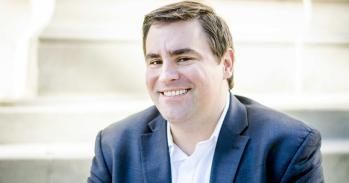
Cambridge has never been short of ideas but the Institute for Manufacturing is dedicated to putting ideas into action.
Cambridge has never been short of ideas but the Institute for Manufacturing is dedicated to putting ideas into action.
The emphasis here is on collaboration – locally, nationally and internationally across disciplines, across centres, across the University and across industries.
Professor Mike Gregory
Turning ideas and opportunities into products and services has traditionally been seen as the role of business and industry. But all too often, new ideas have failed to make the journey to creating substantial new industries. The Institute for Manufacturing (IfM) is dedicated to bridging the gaps between academia, industry and government, to provide a more connected approach to manufacturing and industrial innovation.
From its inception in 1998, the IfM, embedded in the Manufacturing and Management Division of the Department of Engineering, has adopted a broad view of manufacturing to include understanding markets, research, design, product development, production, distribution, services and, increasingly, sustainability. The Institute brings together expertise in engineering, management and policy under one roof, and combines this broad scope within a unique structure that integrates education, research and practice.
‘Introducing people to the challenge and excitement of turning ideas and opportunities into products and services is enormous fun,’ said Professor Mike Gregory, Head of the IfM, ‘and our new purpose-designed building is a perfect home in which to accomplish this.’ Opened in November 2009, IfM’s new £15 million building was made possible by donations from philanthropist Dr Alan Reece, after whom the building is named, The Gatsby Charitable Foundation and local industry. It combines an innovation and design studio, process and automation labs, and state-of-the-art teaching facilities, all leading off a large common room for staff, students and visitors, providing the maximum opportunity for new ideas to spark and spread.
An emphasis on collaboration
Research at the IfM seeks to bring together different fields of knowledge to tackle larger-scale questions that typically lie at the interface between traditional disciplines, as Professor Gregory explained: ‘Universities are great at developing new ideas and Cambridge is clearly no slouch in this regard. But, for those outside the world of academia, ideas are only as good as what you can do with them.’
The IfM started as an exciting ‘experiment’ in bringing theory and practice closer together; it embodies a ground-up approach to addressing some of the major challenges of the day, such as healthcare and sustainability. ‘The opening of our new building marks the end of the first phase of this experiment and the work we have done so far suggests we are only at the beginning of what this configuration can achieve,’ asserted Professor Gregory.
‘The emphasis here is on collaboration – locally, nationally and internationally across disciplines, across centres, across the University and across industries. Indeed, informal networks are already beginning to form spontaneously – just as we hoped they might.’ Professor Gregory argues that the ethos of integration and collaboration provides an excellent complement to the centres of deep expertise within the IfM, around the University and beyond.
Engagement with industry and government is a key distinguishing feature of the Institute. ‘The IfM model is designed to fill a gap in the traditional University structure and allows academics to work with companies of all types and sizes – from helping start-ups and small and medium enterprises, to advising on the global configuration of major corporations,’ explained Professor Gregory. Engagement with policy is just as important, as governments become increasingly focused on industrial innovation and its global context.
Themes on a global scale
‘We see ourselves as a ‘community centre’ for all those involved with manufacturing – students, industrialists, policy makers and other academics. To engage with this community, we need to support the core interests of community members and that’s reflected in our research activities [see panel] and broader themes,’ explained Professor Gregory. The big themes to have emerged at the IfM over the past two years have indeed been global in their scale: Services, Industrial Innovation, Emerging Industries and Industrial Sustainability.
The IfM is already taking a national lead in Services – particularly the design and operation of complex technology-based services. In the recent S4T (Service Support Solutions: Strategy and Transition) project, the IfM headed a consortium of 10 British universities working with BAE Systems to study the continuing transformation of the UK economy towards increasing value generation from product-related services. Under the Industrial Innovation theme, another IfM-led consortium of leading businesses is seeking to identify the skills required, and the barriers that need to be overcome, to implement open innovation models.
The Emerging Industries programme is already shedding new light on the evolution of new industries and identifying ways in which the translation of ideas into action might be accelerated. And, the Industrial Sustainability theme is attracting huge interest and involvement from staff and students alike as the IfM seeks to tackle one of the vital questions of the age – how to provide people across the planet with the goods and services they need without irrevocably damaging the environment.
Inspire, engage, educate
IfM’s new building is a major addition to the University's West Cambridge campus for science and technology. It joins an existing concentration of related research centres, as well as the Hauser Forum a focal point for entrepreneurship and technology transfer. Professor Gregory believes that new challenges and opportunities are now possible after the move to the new facilities: ‘Through the generosity of benefactors Dr Reece and Lord Sainsbury, we have a wonderful platform to inspire, engage and educate people in the excitement and challenge of manufacturing and industrial innovation.’
For more information about research at the IfM, please visit www.ifm.eng.cam.ac.uk/
Research activities at the IfM
Professor Mike Gregory, Head of the IfM, outlines the scope of research activity at the Institute:
R&D
‘Understanding how R&D is conducted and how this is transformed into actual applications is important. Too often R&D is represented at the beginning of the value chain. Work at the IfM has illustrated how it can have impact all along the process.’
Design
‘The IfM’s Design Management Group aims to improve the ways in which design can be managed and exploited, at product, firm and national levels. The group’s Design in Science project is looking at how scientists can benefit from working with designers to aid research.’
Production
‘All of the IfM’s research has real-world benefits. In terms of production, it’s vital that industrial processes are as efficient as possible. The IfM’s Inkjet Research Centre is looking at how manufacturing can be conducted using techniques familiar to anyone who has used a computer printer. Photonics researchers are looking at the impact lasers can have on manufacturing, which could lead to new industrial developments over the next 20 years.’
Distribution
‘We live in an interconnected world and UK business needs to know how to operate on a global level. Our work, such as looking at supply chains in emerging firms and industries, helps facilitate this understanding.’
Services
‘Helping companies to understand how to sell their business as a service rather than just a product is a major element of our work. Our research is helping companies understand important issues like risk and cost mitigation, and the impact of transition towards service provision, which is increasingly an integral part of manufacturing.’
This work is licensed under a Creative Commons Licence. If you use this content on your site please link back to this page.





